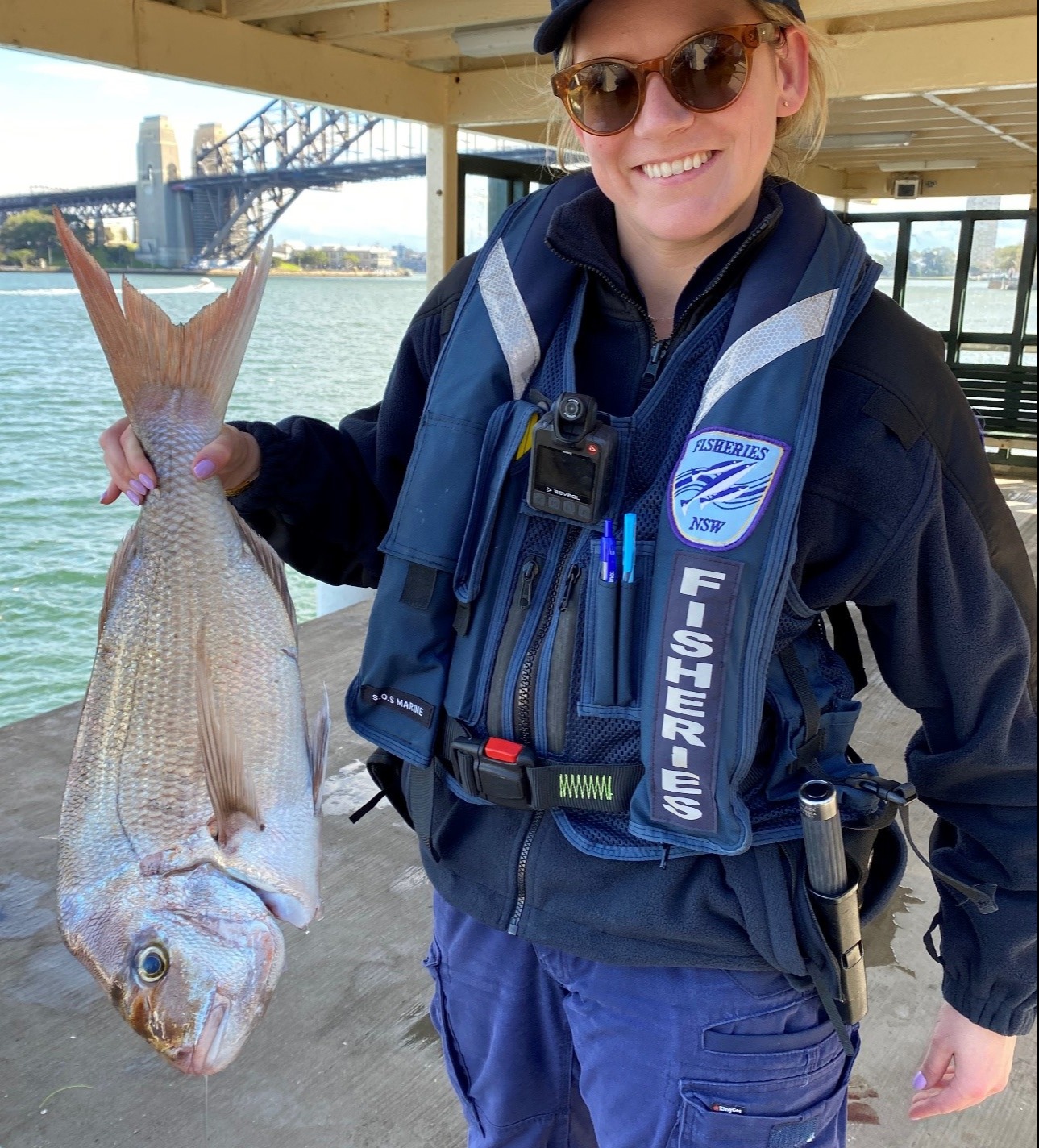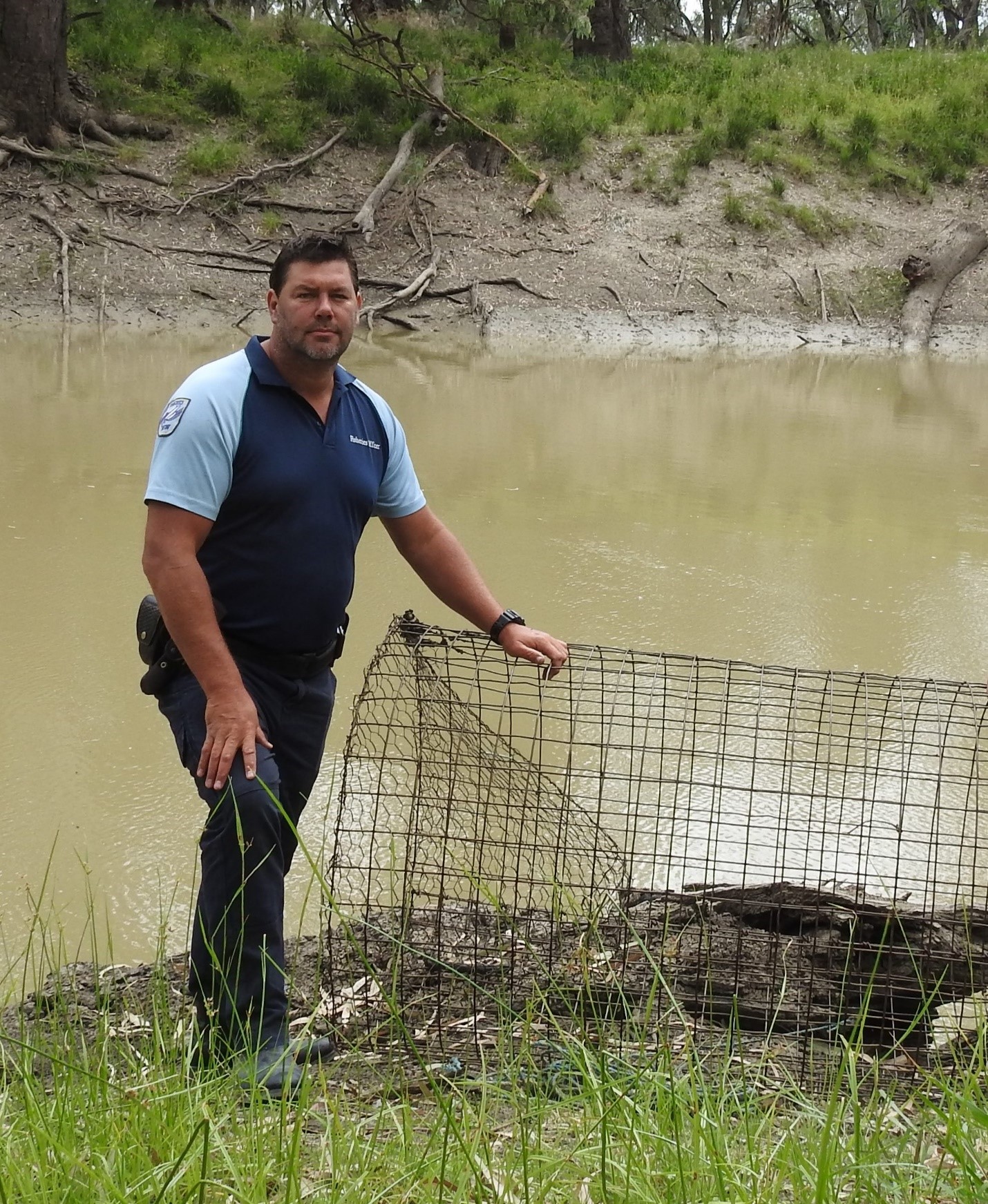
Day in the life of a fisheries officer

Name: Molly
Job Title: Fisheries Officer
Job Location: Wollstonecraft - Sydney North Fisheries Office
Describe your typical day
There is no typical day at NSW Fisheries – every day brings something different. I patrol from North Bondi upwards to Palm Beach, and all the way inland to the Blue Mountains. From 3am starts at Sydney Fish Markets wrestling angry mud crabs, to whales breaching alongside your boat as you conduct offshore patrols on commercial fishermen, to counting buckets of twitching eels in a recreational fishers check – there is truly so much variety in the work. Typically, a day starts with a touch of admin, before setting off for patrol. Patrols may be on recreational fishers, commercial fishers, restaurants and bait shops who sell fish, or a targeted operation on a specific type of offending behaviour.
What attracted you to this profession?
I enjoy compliance work and working within frameworks and policy. I have a natural aptitude for interpreting and applying legislation combined with a passion for the marine environment. I have always had a fascination with sharks and marine life in general, and feel lucky to have the opportunity to protect threatened and protected species
How did you get started?
Most recently, I worked in Compliance at the Environment Protection Authority. I have a Masters in Marine Science and Management from Macquarie University. While at University, I completed an internship with Marine Stewardship Council, and volunteered with Marine Rescue and ORRCA (Organisation for Research and Rescue of Cetaceans in Australia). This combination of experience set me up neatly for a role at Fisheries Compliance.
What initial training did you do?
NSW Fisheries provided three weeks of job-specific training as part of their onboarding program, including topics such as DPIE Core Values & Attributes, Safe Officer Systems, Introduction to Fisheries Officer Powers, Legislation & Work Instructions, Conflict Management, Fish Identification, Measuring techniques etc, Small Boat Handling, Baton & Handcuff & Defensive Tactics training, General Purpose Hand, Elements of Shipboard Safety and Marine Radio Operators Certificate. I have also recently completed my Coxswains qualification after a year in the role.
Is there an ongoing need to update your skills?
Every day is a learning opportunity at NSW Fisheries. There are so many different areas of legislation, fishing rules and regulations, fishing closures, aquatic reserves and marine parks across NSW. I have been lucky enough to work across the state in my first year, gaining new skills from knowledgeable Fisheries Officers across the way.
What keeps you motivated?
I am motivated by the people I work with, achieving fair compliance outcomes and educating the community. I am really grateful to be a NSW Fisheries Officer and contribute to the protection of our precious and unique marine ecosystem.
Who do you work with to do your job?
At Sydney North I work in a team of five comprised of a Senior Fisheries Officer, District Fisheries Officer and three Fisheries Officers. We generally patrol either by car of boat with 2-3 officers at a time. In busier periods or when conducting an operation, we may work with other officers from across the Metropolitan Zone, or with Fisheries Officers who travel from elsewhere in the state to assist.
What is the most interesting thing you have done, discovered or seen in your job?
It is so difficult to narrow this down to one thing, as just about every day I experience something that makes my jaw drop. Tagging bull sharks in Sydney Harbour, taking DNA samples of threatened species at the Fish Markets for analysis, conducting an investigation into illegal fishing activity - all these things are really engaging. Of course, all the amazing fish and sea creatures you see every day are also fascinating. You’re never short of a good story at the dinner table.
How does your work benefit people and/or the environment?
Our work ensures public confidence in sustainable fishing in NSW. We work day and night, weekends and public holidays to ensure people are doing the right thing when accessing our shared fishing resource. Sydney Harbour is home to many juvenile fish and I feel privileged to be able to regulate fishing in the area to ensure sustainable populations for future generations to come. A large part of the role is educating the community on the importance of sustainable fishing practices, as well as taking action when people are doing the wrong thing to ensure protection of the resource.
What advice do you have for students still at school?
I was always discouraged from pursuing Marine Sciences due to a shortage of jobs. I’m glad I didn’t listen. There are so many different paths to get to where you want to go. My advice is that if you have a passion and work hard, you will achieve your dreams. I encourage pursuing volunteering opportunities and saying ‘yes’ – you never know where these connections might lead you.

Name: Brock
Job title: District Fisheries Officer
Job location: Inverell - New England Fisheries Office
Describe your typical day
Most of my days are spent outside, patrolling on a river or dam within the New England District. I patrol these waterways using a number of resources available to us including kayaks, small punts, larger vessels, 4wd patrol vehicle and often on foot walking the banks of river to ensure recreational fishers are enjoying the great outdoors but also abiding by the Fisheries rules.
What attracted you to this profession?
Since I was a kid becoming a fisheries officer was always in the back of my mind and was a dream profession for me. Growing up in Forster and spending a lot of my childhood on Wallis Lake or in the ocean, my love of the outdoors and the environment was the key attraction and my motivation for making this dream come true.
How did you get started?
I have a trade background and spent many years in the building game. In 2005 an opportunity presented itself at Tweed heads and I began to study, completing a Certificate 3 in seafood industry compliance. I spent hours asking questions and learning about the role. It was no easy path for me to become a Fisheries Officer. I applied numerous times to no avail. But I didn’t give up and kept working towards my dream job, eventually getting a start in 2010 on the Central Coast.
What initial training did you do?
I spent the first 6 weeks on the Central Coast with 8-9 other new recruits. We were put through all the necessary and relevant training to help us settle into our new roles. Over the next 12 months I completed a number of training courses which included a coxswain certificate and a certificate 4 in government investigations to name a few.
Is there an ongoing need to update your skills?
Yes, Always. You can never learn enough in this job. Things can change rapidly, and you need the skills and knowledge to be able to adapt and think on the run. Every client engagement is different and my skills in talking and dealing with the public is something I work on and try to improve every day. There are many other areas in the role where my skills are often updated to ensure I can deliver a quality service at all times.
What keeps you motivated?
Knowing that each day I go out in the field, I will have the opportunity to talk to recreational, commercial fishers and other members of the public about fishing in NSW. My motivation is that I can educate fishers about the rules and regulations and make a difference to the attitudes and at times bad habits of some fishers, to enable the protection and management of our native fish stocks and habitat. It’s important that all fishers understand why we need to manage our fisheries to ensure sustainable fish stocks into the future.
Who do you work with to do your job?
I work in the North West of the state in an area known as the New England District. The district is made up of 2 staff: 1 fisheries officer and 1 district fisheries officer (my role). I report to a supervising fisheries officer based in Bathurst and there are 3 other districts within our zone, known as the North West Zone. Each district has a district fisheries officer and fisheries officer. Most of the time I work with my direct colleague. There are times the entire staff of the zone work together to target high risk offenders which may include the need to carry out surveillance over a long period of time.
What is the most interesting thing you have done, discovered or seen in your job?
This would have to be the Brewarrina Fish Traps and the cultural history around them. I have also been to other small communities throughout my district like Collarenebri and observed these communities actively engaging with younger members to pass on important cultural knowledge. Another interesting part of my job in the bush are the encounters with characters you run into. The stories you hear about fishing back in the day and somewhat stretched yarns by some real Aussie larrikins. And then there is the excuses, some of these offered up by fishers when caught red handed are very interesting.
How does your work benefit people and/or the environment?
My role is to engage with people and manage a fisheries resource to ensure our native fish stocks are sustainable into the future. That alone is a benefit to the people whether it be through an educational advisory event, general interaction on the river/dam or the apprehension of a high risk offender. In most cases these people I speak to are happy to see me and appreciate the role that I perform.
What advice do you have for students still at school?
Be honest and passionate about your interests and what you believe in. When you finish your education and start applying for roles that interest you, don’t give up if you are not successful the first-time round. Identify the areas you didn’t do so well in and work on these so you are better prepared next time.

